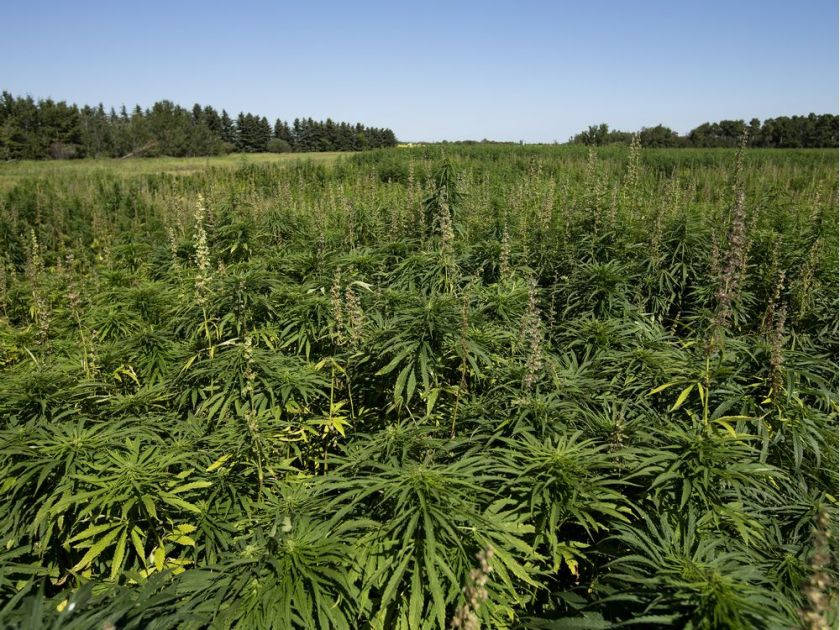You are here
Home 🌿 Recreational Marijuana News 🌿 Hemp licence applications boom but some experienced farmers urge caution 🌿Hemp licence applications boom but some experienced farmers urge caution

The legalization of cannabis and the ongoing Chinese ban on Canadian canola is sparking a boom of interest in hemp among Prairie farmers, but some experienced producers are warning of "unrealistic expectations."
According to Statistics Canada, the number of hemp acres planted by farmers nationwide is expected to double this year, from 41,200 in 2018 to 82,500 in 2019. While Health Canada — which licenses farmers to grow industrial hemp — will not release its 2019 figures until this fall, the Canadian Hemp Trade Alliance industry group said it has been told the number of licence applications has more than doubled this year and the majority of new applicants are first-time hemp growers.
“Hemp’s been grown in Canada for 20 years, but it was always sort of culturally viewed as a crop that’s not part of the mainstream. There was always that attitude of, ‘that guy grows pot,’ ” said Ted Haney, executive director of the Canadian Hemp Trade Alliance. “Today, like chickpeas, lentils or quinoa, it’s just another one of the hot options out there. It’s increasingly being looked at as a mainstream crop.”
There are a variety of reasons for the sudden explosion of interest in hemp. Until recently, farmers with licences to grow industrial hemp — which in its food-based application can be used to produce cooking oil, edible seeds, protein powders and more — needed to undergo a criminal records check and were forbidden from harvesting any part of the crop except the seeds and stems. (Hemp is a member of the cannabis family, and though it contains virtually no psychoactive THC it does contain CBD, a non-intoxicating cannabinoid.)
But the legalization of cannabis earlier this year means farmers are now permitted to harvest the whole hemp plant and sell it to licensed marijuana producers for the purpose of CBD extraction and sale. That’s driving new interest and optimism among farmers, Haney said, though the economics of harvesting hemp for CBD from a farmer perspective remain relatively unknown.
Another possible reason for the increase in hemp acres, Haney said, is the ongoing trade issues Prairie farmers are encountering with other commodities — chiefly canola, which is the subject of an ongoing ban by China, but also pulses and durum wheat, which are facing export challenges in key markets such as India and Italy.
“I hear farmers say, ‘you know, we’re just continuing to look for a bit of a broader mix and not be so vulnerable to a single crop,’ ” Haney said. “That’s the mindset. It’s not that hemp’s the answer, it’s just to spread the risk.”
But while hemp undoubtedly has potential, experienced growers are concerned there may be a bit of a gold rush mentality happening right now. Will Van Roessel, a farmer and seed producer near Bow Island in southeast Alberta, has been growing hemp for the food market for the past 10 years and did some CBD harvesting for the first time last year. While he said he will be selling to the CBD market again this year and is generally upbeat about the future of the hemp industry, he also sounded a cautionary note.
“Right now, there seems to be a lot of investment from non-farm people in the CBD business, which is a bit concerning because some of those people don’t have very good knowledge of what happens on a farm or how farm production practices go. I think there are some unrealistic expectations out there from investors,” Van Roessel said.
Van Roessel added some growers are signing on with cannabis companies that haven’t even built a CBD extraction and processing facility.
“They’re getting farmers to grow for them but they haven’t even built a processing plant yet to deal with the harvest of this crop,” he said. “These farmers are taking a significant risk that by the time they’re ready to harvest their crop, there won’t be anybody there to take that crop and pay for it.”
Many of the farmers experimenting with hemp for the first time are first getting their feet wet by seeding a small number of acres, or even just a “garden-sized plot,” Van Roessel said. That’s likely a smart move, he added, saying he wouldn’t discourage a farmer who was interested in hemp but would urge them not to get carried away.
“I would encourage them to try it, but I’d caution them about some of the risks,” he said. “Especially growing a large area for a company that hasn’t even built a processing plant yet. And there’s a lot of those out there.”
420 Intel is Your Source for Marijuana News
420 Intel Canada is your leading news source for the Canadian cannabis industry. Get the latest updates on Canadian cannabis stocks and developments on how Canada continues to be a major player in the worldwide recreational and medical cannabis industry.
420 Intel Canada is the Canadian Industry news outlet that will keep you updated on how these Canadian developments in recreational and medical marijuana will impact the country and the world. Our commitment is to bring you the most important cannabis news stories from across Canada every day of the week.
Marijuana industry news is a constant endeavor with new developments each day. For marijuana news across the True North, 420 Intel Canada promises to bring you quality, Canadian, cannabis industry news.
You can get 420 Intel news delivered directly to your inbox by signing up for our daily marijuana news, ensuring you’re always kept up to date on the ever-changing cannabis industry. To stay even better informed about marijuana legalization news follow us on Twitter, Facebook and LinkedIn.




